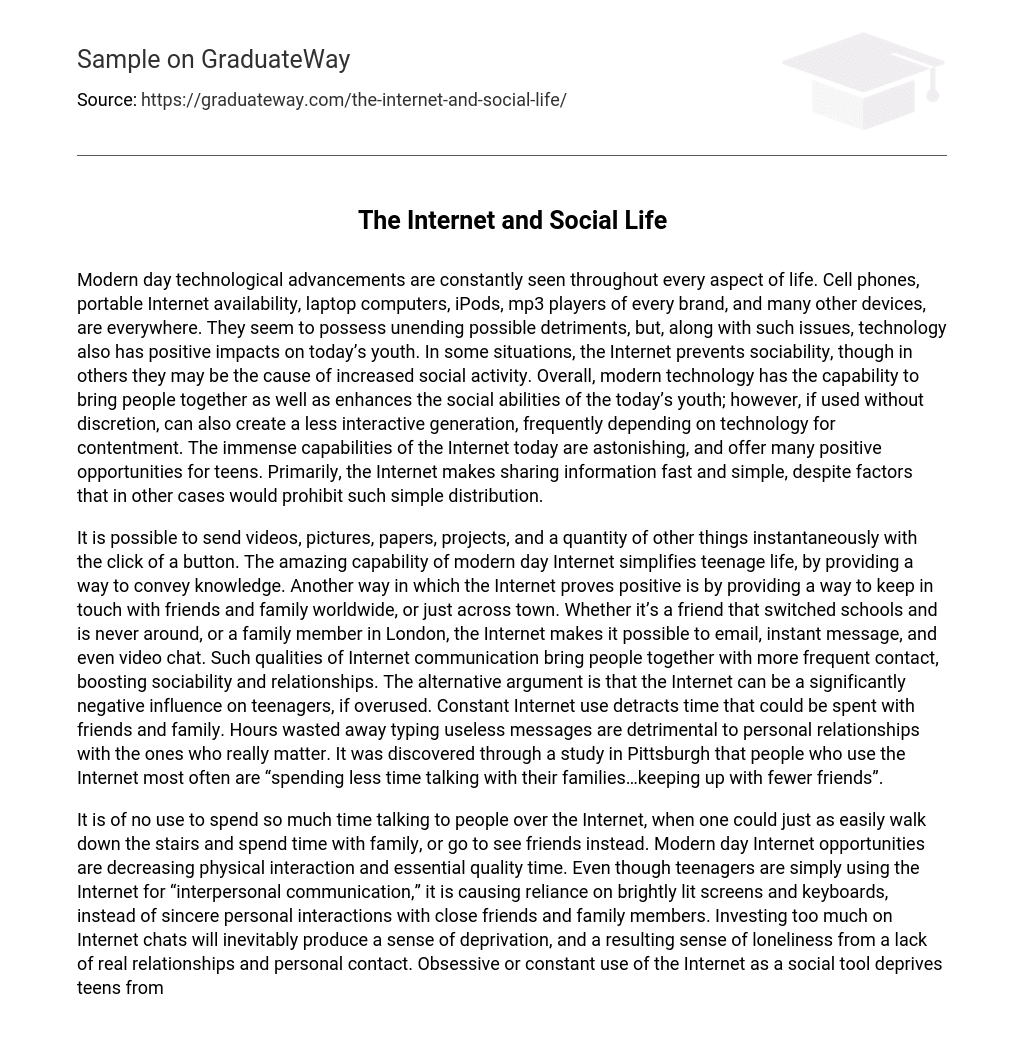Modern day technological advancements are constantly seen throughout every aspect of life. Cell phones, portable Internet availability, laptop computers, iPods, mp3 players of every brand, and many other devices, are everywhere. They seem to possess unending possible detriments, but, along with such issues, technology also has positive impacts on today’s youth. In some situations, the Internet prevents sociability, though in others they may be the cause of increased social activity. Overall, modern technology has the capability to bring people together as well as enhances the social abilities of the today’s youth; however, if used without discretion, can also create a less interactive generation, frequently depending on technology for contentment. The immense capabilities of the Internet today are astonishing, and offer many positive opportunities for teens. Primarily, the Internet makes sharing information fast and simple, despite factors that in other cases would prohibit such simple distribution.
It is possible to send videos, pictures, papers, projects, and a quantity of other things instantaneously with the click of a button. The amazing capability of modern day Internet simplifies teenage life, by providing a way to convey knowledge. Another way in which the Internet proves positive is by providing a way to keep in touch with friends and family worldwide, or just across town. Whether it’s a friend that switched schools and is never around, or a family member in London, the Internet makes it possible to email, instant message, and even video chat. Such qualities of Internet communication bring people together with more frequent contact, boosting sociability and relationships. The alternative argument is that the Internet can be a significantly negative influence on teenagers, if overused. Constant Internet use detracts time that could be spent with friends and family. Hours wasted away typing useless messages are detrimental to personal relationships with the ones who really matter. It was discovered through a study in Pittsburgh that people who use the Internet most often are “spending less time talking with their families…keeping up with fewer friends”.
It is of no use to spend so much time talking to people over the Internet, when one could just as easily walk down the stairs and spend time with family, or go to see friends instead. Modern day Internet opportunities are decreasing physical interaction and essential quality time. Even though teenagers are simply using the Internet for “interpersonal communication,” it is causing reliance on brightly lit screens and keyboards, instead of sincere personal interactions with close friends and family members. Investing too much on Internet chats will inevitably produce a sense of deprivation, and a resulting sense of loneliness from a lack of real relationships and personal contact. Obsessive or constant use of the Internet as a social tool deprives teens from necessary relationships that are crucial to life, especially throughout high school and college, which will ultimately result in a damaging sense of loneliness and depression.
The Internet affects today’s youth in positive ways; however, when not used in moderation, can become negative influences as well. Modern technologies are positive by providing simple communication, unifying diversities, and deepening the experiences of the world. Those same technological advancements can become highly addictive, and like all addictions, have negative consequences. Teens who are constantly engaged in using technologies become so addicted that they spend less time with loved ones, and feel lonely and depressed. Technological addiction is leading to a more isolated generation, overly dependent on technology. Modern technological advances, particularly the Internet, have many positive effects on today’s youth, yet if overused can lead to addiction, which consequently produces negative influences and obsession. Although technology can be profitable, it must be used in moderation, as not to damage the social ability of today’s youth.





